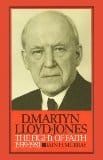D. Martyn Lloyd-Jones: The Fight of Faith 1939-1981


“The immense value of church history and of the history of doctrine is the dimension of historical depth it gives to one’s understanding of the faith, and of the balance it brings to one’s judgments. Did ever the church stand in greater need of this?” (T.F. Torrance)
Dr. Martyn Lloyd-Jones is not a household name today, even though he died a relatively short time ago. I knew of him as a brilliant thinker, a physician who became a pastor of Westminster Chapel in London near Buckingham Palace. I’ve heard and appreciated some of his sermons, and I have some of his books. It wasn’t until I heard Tim Keller continually refer to him that I decided to learn more.
The result is a deep appreciation for an incredible ministry. Reading biographies of great men is inspiring, and this one is no different. I benefited from seeing accounts of Lloyd-Jones as he pastored a church in London during the worst of World War II, with bombs exploding nearby; as he dealt with difficult deacons and patiently pastored a church while allowing God to change hearts; as he became known for his preaching ministry and began to speak all over the world; and as he dealt with controversies that continue today. You can’t help but read all that he went through without learning as you think through the issues and weigh what you would have done.
But what really struck me as I read this volume is the benefits of being out of step with the times. It’s popular today to say that we live in a new day, and that everything has to change. But things weren’t all that different when Lloyd-Jones was alive. Many within the church were arguing for new approaches. For example, one person argued in 1976 that his method of preaching was out of date:
What one must question, however, is this: is our age ever going to accept monologue again? Does it not seem that our generation is demanding, and insisting on the right of talk-back?…One way communication may have been sufficient in the past. Nowadays there is feed-back, and right of reply, and letters to the editor: must the preacher be the sole exception to this general trend?
Lloyd-Jones, however, never lost confidence in the power of the Word proclaimed, and the results were profound.
Other trends in his day included increased reliance on business methods and entertainment in an effort to become more effective. Lloyd-Jones resisted these trends. As a physician, he had diagnosed the problem differently, and more entertainment and better methods would never be enough. “The modern church was bypassing her primary need,” writes Iain Murray. “She was adopting ‘methods of big business and advertising’ instead of praying for a visitation of God.” His focus was not on new methods, but on preaching and applying the gospel and relying on God’s power.
Iain Murray’s biography is not hagiography. You do get a sense of where Lloyd-Jones struggled, and he seemed to be aware of these areas as well. But I can’t tell you how much I appreciated reading of his life and ministry, and how much I learned as a result. Every pastor could benefit from reading these books.
More from Amazon.com | Amazon.ca





